Listing your rental property on short-term rental platforms like Airbnb and VRBO can be a great way to boost occupancy and income. But which platform is right for you? In this guide, we compare VRBO vs. Airbnb for hosts, helping landlords understand the key differences in fees, features, and guest expectations.
If you're hosting your property on Airbnb or VRBO, make sure your short-term rental is properly insured. Steadily offers landlord insurance for short-term rentals in all 50 states—including Airbnb insurance.
Airbnb vs. VRBO for owners: key differences
Airbnb and VRBO are both leading vacation rental platforms, but they cater to slightly different types of hosts and travelers. Here are the most important distinctions:
- Property Types: Airbnb allows hosts to list anything from a shared room to an entire house. VRBO only allows entire-home rentals, which may be better suited for landlords looking to rent full properties.
- Guest Audience: Airbnb attracts a broad demographic, including solo travelers, couples, and digital nomads. VRBO focuses more on families and groups booking vacation stays.
- Length of Stay: Airbnb is popular for shorter stays and urban rentals, while VRBO tends to attract longer vacation-style bookings.
- User Experience: Airbnb offers dynamic pricing tools and more robust in-app communication. VRBO has a more straightforward booking process with fewer guest requirements.
Airbnb vs. VRBO fees for hosts
Understanding platform fees is crucial when evaluating your rental income. Here’s how the two compare:
- Airbnb Fees: Airbnb uses a split-fee model by default. Hosts are charged 3%, and guests pay around 14%. For hotels and some software-connected hosts, Airbnb offers a host-only fee model (14-16%). Source
- VRBO Fees: VRBO offers two options: a pay-per-booking model (5% host fee + 3% payment processing) or a $499 annual subscription. Guests typically pay a service fee of 6-15%. Source
Market share and reach
As of 2024:
- Airbnb dominates the short-term rental space, with over 150 million users and listings in 220+ countries.
- VRBO, part of the Expedia Group, has millions of users but a smaller market share, primarily in the U.S. and vacation-specific markets.
Listing on VRBO vs. Airbnb: what to expect
Listing a rental on either platform involves similar steps: creating a listing, uploading high-quality photos, setting availability and pricing, and communicating with guests. However:
- Airbnb offers more automation tools and dynamic pricing.
- VRBO may appeal to hosts who prefer less frequent but longer bookings.
Read more: Hosting Airbnb This Summer? Here's What You Need To Know
Decision guide: when to use Airbnb vs. VRBO
- Use Airbnb if your property is in an urban area, caters to solo travelers or couples, or offers a unique experience (like a loft, studio, or cabin).
- Use VRBO if your rental is a full home in a vacation destination and you’re targeting families or larger groups.
- Airbnb is better for dynamic pricing, higher visibility in competitive urban markets, and attracting a broader range of guests.
- VRBO is better for consistent bookings, fewer guest turnovers, and a family-oriented audience who typically stay longer and book further in advance.
- Consider listing on both platforms if you want to maximize exposure and occupancy, especially if your property appeals to both markets.
Don’t Forget insurance for your short-term rental
Regardless of which platform you choose, proper coverage is essential. Many hosts assume that platform guarantees are enough, but those often don’t cover liability, dwelling damage, or loss of rent.
Steadily offers comprehensive short term rental insurance for landlords. It covers you whether you're listing on Airbnb, VRBO, or both. We offer short-term rental insurance in all 50 states, from New York to Texas to California to Colorado to Hawaii.
Get a quote from Steadily and make sure your property is protected—so you can focus on bookings, not breakdowns.






.png)
.jpg)
.jpg)


.png)